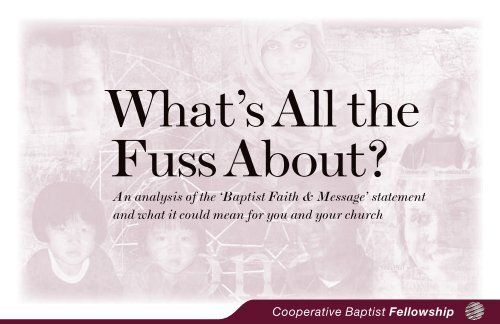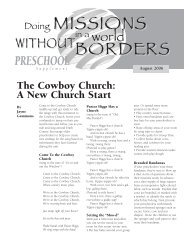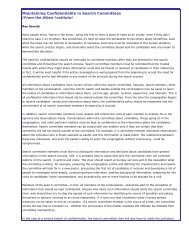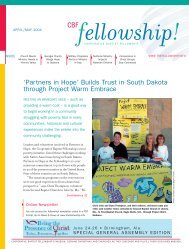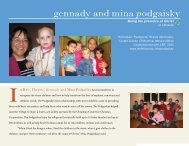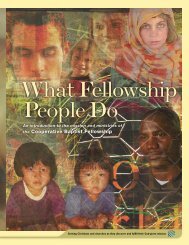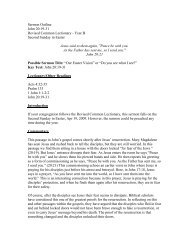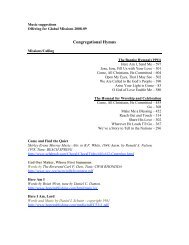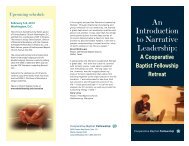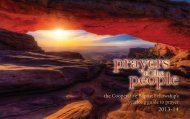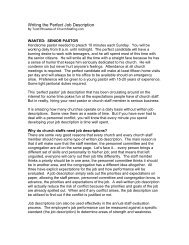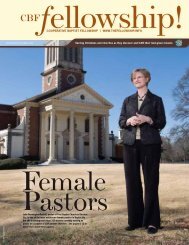What's All the Fuss About? - Cooperative Baptist Fellowship
What's All the Fuss About? - Cooperative Baptist Fellowship
What's All the Fuss About? - Cooperative Baptist Fellowship
- No tags were found...
You also want an ePaper? Increase the reach of your titles
YUMPU automatically turns print PDFs into web optimized ePapers that Google loves.
2They spoke of freedom in <strong>the</strong> early days. When those who eventually named <strong>the</strong>mselvesSou<strong>the</strong>rn <strong>Baptist</strong>s first came toge<strong>the</strong>r in 1845 at <strong>the</strong> First <strong>Baptist</strong> Church of Augusta, Georgia,<strong>the</strong>y refused to adopt any statement of common doctrinal belief — not even a confession andcertainly not a creed. Their stance was based on a “<strong>Baptist</strong> aversion to all creeds.” For <strong>the</strong>80 years from 1845 until 1925, that’s <strong>the</strong> way it stood — no official statement of belief for those known asSou<strong>the</strong>rn <strong>Baptist</strong>s.This changed in 1925. Out of a reaction to <strong>the</strong> evolution controversy of <strong>the</strong> early 20th century, <strong>the</strong> Sou<strong>the</strong>rn <strong>Baptist</strong>Convention appointed a committee chaired by E.Y. Mullins to draw up a recommended statement of <strong>the</strong> <strong>Baptist</strong> faith.That statement, largely a recasting of <strong>the</strong> New Hampshire Confession of 1833, sufficed for 38 years. But <strong>the</strong>n in 1963, againresponding to what some saw as <strong>the</strong> threat of modernism, Sou<strong>the</strong>rn <strong>Baptist</strong>s revised <strong>the</strong>ir doctrinal document to fit <strong>the</strong> current<strong>the</strong>ological situation.Significantly, however, <strong>the</strong> writers of <strong>the</strong> <strong>Baptist</strong> Faith & Message of 1963 (and those who adopted it at <strong>the</strong> annualconvention meeting of that year) again made clear that <strong>the</strong>y saw this statement as no creedal formula. As Herschel Hobbs, <strong>the</strong>chair of <strong>the</strong> group that wrote <strong>the</strong> 1963 statement said it, “<strong>Baptist</strong>s have always shied away from anything that resembled a creedor a statement of beliefs to which <strong>the</strong>ir people were forced to subscribe.”That’s <strong>the</strong> history of Sou<strong>the</strong>rn <strong>Baptist</strong>s to this point: 80 years without so much as a confession of belief, <strong>the</strong>n <strong>the</strong> last 75 yearswith two different statements but never with any desire to force any doctrinal uniformity on churches or individuals. As noted<strong>the</strong>ologian Fisher Humphreys said it, “<strong>Baptist</strong>s do not have creeds. They insist that <strong>the</strong> only written authority for Christian lifeand faith is <strong>the</strong> Bible.”Now, it is evident that <strong>the</strong> leadership of <strong>the</strong> SBC wants to change this historic <strong>Baptist</strong> rejection of creeds. With <strong>the</strong> adoptionof <strong>the</strong> <strong>Baptist</strong> Faith & Message statement at its meeting in Orlando in June 2000, <strong>the</strong> SBC has in place an instrument that callsfor a conformity of doctrine never before seen in <strong>Baptist</strong> life.
The <strong>Baptist</strong> Faith & Message,2000 VersionMost of <strong>the</strong> media attention to <strong>the</strong> <strong>Baptist</strong> Faith & Message focused on its statement thatwomen are excluded from pastoral ministry. This is an important issue and will be addressedin this analysis. At <strong>the</strong> same time, however, <strong>the</strong> BFM also raises o<strong>the</strong>r issues ofconcern for <strong>Baptist</strong>s. Of <strong>the</strong>se, two are perhaps most crucial: (1) <strong>the</strong> place of <strong>the</strong> doctrine of soulcompetency in <strong>Baptist</strong> thought (soul competency defined as a person’s right and responsibility tointerpret Scripture and practice faith as a distinct individual before God) and (2) <strong>the</strong> relationship ofJesus and <strong>the</strong> Bible.The <strong>Baptist</strong> Faith & MessageStatement:• More authority, less freedom• More book, less Jesus• More male, less femaleMore Authority, Less FreedomEven a cursory examination makes it clear that <strong>the</strong> revised BFM seeks to “tighten up” <strong>the</strong> <strong>the</strong>ologicalbindings around <strong>the</strong> hearts and lives of <strong>the</strong> Sou<strong>the</strong>rn <strong>Baptist</strong> faithful. That’s evident fromtwo changes made in <strong>the</strong> statement: (1) a de-emphasis on <strong>the</strong> doctrine of soul competency and (2) aheightened emphasis on “doctrinal accountability”The 1963 preamble includes <strong>the</strong>se important words: “<strong>Baptist</strong>s emphasize <strong>the</strong> soul’s competencybefore God, freedom in religion, and <strong>the</strong> priesthood of <strong>the</strong> believer.” In contrast, <strong>the</strong> 2000 versionof <strong>the</strong> BFM as originally proposed by <strong>the</strong> SBC review committee didn’t even mention “soul competency”or “priesthood of <strong>the</strong> believer.” After extensive criticism in <strong>the</strong> weeks prior to <strong>the</strong> convention,<strong>the</strong> committee acquiesced, reinserting <strong>the</strong>se hallowed <strong>Baptist</strong> phrases prior to <strong>the</strong> vote by SBC messengers.But, even as <strong>the</strong>y did, <strong>the</strong>y subtly de-emphasized <strong>the</strong>m. Instead of <strong>the</strong> saying that <strong>Baptist</strong>s“cherish” <strong>the</strong>se principles (as <strong>the</strong> 1963 statement says), <strong>the</strong> preamble goes only so far as to say <strong>Baptist</strong>s“honor” <strong>the</strong>m. More importantly; <strong>the</strong> preamble calls for believers’ “accountability to each o<strong>the</strong>runder <strong>the</strong> Word of God.”3
4With <strong>the</strong> adoption of <strong>the</strong> <strong>Baptist</strong>Faith & Message statement at itsmeeting in Orlando in June 2000,<strong>the</strong> SBC has in place an instrumentthat calls for <strong>the</strong> conformity ofdoctrine never before seen in<strong>Baptist</strong> life.OTHER VOICESNote: These quotes are excerpted frompreviousely published articles.“The revisions seem designed toencourage those who disagree with<strong>the</strong> authors to leave <strong>the</strong> SBC.The 1925 and 1963 confessionshad a different goal: to unite adiverse people around <strong>the</strong> largetruths of <strong>the</strong> faith and some sharedtasks. The earlier authors got itright. They understood whatit meant to <strong>Baptist</strong>s.”— Mike Smith, Memphis, Tenn.“Real <strong>Baptist</strong>s?”This is more than a semantic change. Alarmingly, <strong>the</strong> very doctrine that F. Y. Mullins called <strong>Baptist</strong>s’“distinctive contribution to <strong>the</strong> religious life and thought of mankind” has been altered in <strong>the</strong>document that supposedly defines <strong>the</strong> <strong>the</strong>ology of Sou<strong>the</strong>rn <strong>Baptist</strong>s.Surely, <strong>Baptist</strong>s believe we are accountable in <strong>the</strong> sense that we should test our beliefs by whatwe learn from o<strong>the</strong>r Christians, whe<strong>the</strong>r <strong>the</strong>y are Sunday School class members, our pastors or ouro<strong>the</strong>r Christian friends. But <strong>Baptist</strong>s have believed that ultimately a person is accountable only toGod. To suggest anything else allows for <strong>the</strong> possibility of a human tribunal set up to determine <strong>the</strong>quality of one’s Christian faith and belief.Why this de-emphasis on “soul competency” and “priesthood of <strong>the</strong> believer?” A glance at recenthistory suggests one answer: those currently in power in <strong>the</strong> SBC are deliberately attacking this basicprinciple of <strong>Baptist</strong>s in order to increase <strong>the</strong> authority of <strong>the</strong> pastor and <strong>the</strong> national denomination.Consider <strong>the</strong>se recent developments:• In an analysis of Mullins’ writings published by Broadman and Holman in 1997, Al Mohler, presidentof Sou<strong>the</strong>rn Seminary and one of <strong>the</strong> architects of <strong>the</strong> BFM, described soul competency as“an acid dissolving religious authority, congregationalism, confessionalism and mutual <strong>the</strong>ologicalaccountability.”• At <strong>the</strong> 1988 meeting of <strong>the</strong> SBC, messengers passed a resolution on pastoral authority thatclaimed that <strong>the</strong> doctrine of <strong>the</strong> priesthood of <strong>the</strong> believer was a relatively “recent” developmentin <strong>Baptist</strong> life, and that “<strong>the</strong> pastor is <strong>the</strong> ruler of <strong>the</strong> church.”• Now, <strong>the</strong> <strong>Baptist</strong> Faith & Message de-emphasizes this historic doctrine in favor of a doctrine ofaccountability.Consider what’s left out of <strong>the</strong> 1963 version and what’s added to <strong>the</strong> new model. The 1963 preamblesaid this about <strong>Baptist</strong> confessions: “Such statements have never been regarded as complete,infallible statements of faith, nor as official creeds carrying mandatory authority.” Though <strong>the</strong> newstatement does admit that it has no “quality of finality or infallibility,” it no longer contains <strong>the</strong> languagethat clearly says it isn’t a creed. To <strong>the</strong> contrary, it now includes words that effectively call for itto function as exactly that. The 2000 version’s preamble speaks of confessions of faith “as instruments
of doctrinal accountability,” and states that <strong>the</strong> doctrines voiced in <strong>the</strong> BFM are “essential to <strong>the</strong> <strong>Baptist</strong>tradition of faith and practice.”One doesn’t have to look too deeply to see <strong>the</strong> implications of such statements. “An instrumentof doctrinal accountability” sounds a lot like a test of what one believes — in o<strong>the</strong>r words, a creed.Hobbs himself, speaking of <strong>the</strong> statements about soul competency and freedom in <strong>the</strong> preamble of<strong>the</strong> 1963 document, said if <strong>the</strong>se words “be denied or ignored, <strong>the</strong>n <strong>the</strong> statement becomes a creed.”Recent history suggests <strong>the</strong> <strong>Baptist</strong> Faith & Message may be used to “disfellowship” or excludechurch members from local congregations or churches from associations, state conventions or nationalSBC participation. Significantly, one state convention, New Mexico, already has a committeecharged with studying <strong>the</strong> possibility of making adherence to <strong>the</strong> 1998 BFM <strong>the</strong> criterion by whichit allows churches to remain in good standing with <strong>the</strong> convention and to participate in its annualmeeting. As fundamentalists consolidate control in o<strong>the</strong>r states, <strong>the</strong>y no doubt will want “accountability”in <strong>the</strong>ir churches also. And that affects every <strong>Baptist</strong> in <strong>the</strong> pew.The 2000 version of <strong>the</strong> <strong>Baptist</strong>Faith & Message achieves (1)a deemphasis on <strong>the</strong> doctrineof soul competency and (2) aheightened emphasis on “doctrinalaccountability.”More Book, Less JesusCharles Wade, executive director of <strong>the</strong> <strong>Baptist</strong> General Convention of Texas, noted that <strong>the</strong><strong>Baptist</strong> Faith & Message “elevates <strong>the</strong> Bible above Christ.” Tony Cartledge, editor of <strong>the</strong> BiblicalRecorder, <strong>the</strong> state <strong>Baptist</strong> paper of North Carolina, said, “The changes put into writinga shift from <strong>the</strong> Living Word to <strong>the</strong> written word as <strong>the</strong> Christian’s supreme authority, diminishing<strong>the</strong> role of a believer’s personal experience with Christ as a guide for faith and practice. Christ is nolonger seen as <strong>the</strong> pinnacle of God’s self-revelation, but as <strong>the</strong> focus of God’s written revelation.” Fora <strong>Baptist</strong>, any document that elevates anything — even <strong>the</strong> Bible — above Jesus should be a matter ofdeep concern.In <strong>the</strong> “Scripture” section of <strong>the</strong> BFM, three changes were made. First, <strong>the</strong> reference to <strong>the</strong> Bible as“<strong>the</strong> record of God’s revelation” was changed to say <strong>the</strong> Bible is “<strong>the</strong> revelation.” Second, <strong>the</strong> phrase,OTHER VOICES“God has called and will continueto call whomever God chooses,male and female. The challenge for<strong>Baptist</strong>s is to ... recognize that eachperson is ultimately responsible toGod and God alone for <strong>the</strong>call <strong>the</strong>y hear.”— Donna Forrester, Greenville, S.C.“Attempting to Limit God’s Call”5
6“An instrument of doctrinalaccountability” sounds a lot like atest of what one believes — in o<strong>the</strong>rwords, a creed.OTHER VOICES“So, <strong>the</strong> SBC leaders — whotrumpeted ‘biblical inerrancy’ as abattle cry to gain and implementcontrol of <strong>the</strong> convention for <strong>the</strong>past 20 years — have a high viewof Scripture, after all. In fact, it’shigher than we thought. Ra<strong>the</strong>r thana Trinity, <strong>the</strong>y worship a defactoQuartet: Fa<strong>the</strong>r, Son, Holy Spirit, andHoly Bible, with <strong>the</strong> Bible acting as<strong>the</strong> arbiter of <strong>the</strong> o<strong>the</strong>r three.”— Marv Knox, Dallas, Texas“Debate Distills Decades of Division”“<strong>the</strong>refore, all Scripture is totally true and trustworthy” was added. Third, <strong>the</strong> phrase, “The criterionby which <strong>the</strong> Bible is to be interpreted is Jesus Christ,” was altered to say, “<strong>All</strong> Scripture is a testimonyto Christ, who is Himself <strong>the</strong> focus of divine revelation.”Obviously, such <strong>the</strong>ological subtleties are easily lost in <strong>the</strong> midst of daily struggles to live <strong>the</strong>Christian life. After all, what does it mean to most people to say <strong>the</strong> Bible is <strong>the</strong> “revelation,” insteadof <strong>the</strong> “<strong>the</strong> record of ” revelation? And why does it matter that <strong>the</strong> statement removes <strong>the</strong> wordsregarding Jesus as <strong>the</strong> “criterion” for Bible interpretation?Consider this: if <strong>the</strong> Bible is “God’s revelation of Himself to man,” <strong>the</strong>n where does that leaveJesus? Don’t most <strong>Baptist</strong>s believe that Jesus is God’s revelation of Himself to humanity? Yes, <strong>the</strong>Bible transmits <strong>the</strong> story of that revelation. Out of <strong>the</strong> pages of <strong>the</strong> Bible walks this person who isnone o<strong>the</strong>r than <strong>the</strong> Word made flesh. But to say <strong>the</strong> Bible is <strong>the</strong> “revelation” elevates it above JesusChrist. And that is contrary to what <strong>Baptist</strong>s have historically believed. Though <strong>Baptist</strong>s look toScripture as <strong>the</strong> primary guide for faith and practice, we are first and foremost a Jesus people whobelieve that everything before and after Christ must be interpreted through <strong>the</strong> lens of Christ’s lifeand teachings. Therefore, to call <strong>the</strong> Bible “God’s revelation,” and <strong>the</strong>n refer to Jesus only as <strong>the</strong>“focus of divine revelation,” makes it sound like <strong>the</strong> written word is <strong>the</strong> revelation itself while <strong>the</strong>Jesus on which it focuses is simply <strong>the</strong> centerpiece of <strong>the</strong> mosaic. It makes <strong>the</strong> Bible <strong>the</strong> criterionby which Jesus is judged instead of <strong>the</strong> o<strong>the</strong>r way around. Thus, it elevates <strong>the</strong> Bible to a levelabove Jesus.But no one is saved simply because <strong>the</strong>y have read a Bible. They are redeemed only by a personalrelationship with a Living Lord. After all, what about early believers who trusted Jesus before <strong>the</strong>Bible as we have it came into existence? Or those believers in earlier centuries who trusted Christ inan age when only priests had Bibles? And what about those today (in cultures o<strong>the</strong>r than American)who might hear of Jesus but who have never seen nor heard of a Bible?As Charles Wade said it, “Every method of interpreting <strong>the</strong> Bible needs a guiding principle. And<strong>Baptist</strong>s should make it clear that guiding principle is Christ. The Christological principle of hermeneuticsis vitally important and <strong>the</strong> committee took that out. I deeply regret that.”
More Male, Less FemaleAs noted earlier, most news articles regarding <strong>the</strong> revised BFM have focused on <strong>the</strong>“Church” section where <strong>the</strong> writers exclude women from <strong>the</strong> possibility of serving as pastors.The statement says, “While both men and women are gifted for service in <strong>the</strong> church,<strong>the</strong> office of <strong>the</strong> pastor is limited to men as qualified by Scripture.”No one can argue that those who believe this can make a biblical case for it. By <strong>the</strong> same token,however, those who disagree with this position can also use Scripture to defend <strong>the</strong>ir viewpoint.For example, in I Corinthians 11: 5, <strong>the</strong> Apostle Paul speaks of prophesying. He encourages men toprophesy with <strong>the</strong>ir heads uncovered and women to prophesy with <strong>the</strong>ir heads covered.A double point can be made. One, not even <strong>the</strong> most ardent Sou<strong>the</strong>rn <strong>Baptist</strong> demands bonnets inchurch anymore! But, two, and more seriously, “prophesy” literally means “preach,” and it refers here toboth men and women. Yes, it’s true that in I Corinthians 14:34, Paul calls for women to keep silent andin I Timothy 2:12, he forbids a woman to have authority over a man. Yet, in Romans 16:2, he commands<strong>the</strong> church at Rome (that included men) to “assist” Phoebe (a woman) in “whatever business she hasneed of you, for indeed she has been a helper of many and of myself also.” Paul instructs <strong>the</strong> church to dowhat Phoebe asked. He gives a position of authority to a woman because she had been a “helper” to him.Additionally, Luke 2:36 speaks of Anna as a “prophetess,” as one who “spoke of Him to all thosewho looked for redemption in Jerusalem.” That sounds a lot like Anna was a preacher!It’s true that <strong>the</strong>se passages don’t necessarily refer to <strong>the</strong> pastoral office. But <strong>the</strong>se and o<strong>the</strong>r scripturescan be used to make an important point: The Bible displays an internal tension over <strong>the</strong> issue ofwomen in ministry; we, <strong>the</strong>refore, should take care when we try to use it to prove our particular case.Just as <strong>the</strong> Bible leaves room for interpretation here, so also should we.Ironically, on <strong>the</strong> same day that <strong>the</strong> SBC committee published its proposed revisions to <strong>the</strong> <strong>Baptist</strong>Faith & Message, USA Today carried an article about Anne Graham Lotz, daughter of <strong>the</strong> famousevangelist Billy Graham. In that article, Graham called her <strong>the</strong> “best preacher in <strong>the</strong> family.” Though<strong>the</strong> leaders of <strong>the</strong> SBC have every right to state <strong>the</strong>ir opinions regarding <strong>the</strong> roles of women in <strong>the</strong>Recent history suggests <strong>the</strong> <strong>Baptist</strong>Faith & Message may be used to‘disfellowship’ or exclude churchmembers from local congregationsof churches from associations,state conventions or national SBCparticipation.OTHER VOICES“The real sadness of it is <strong>the</strong>underlying sense ... of a deep desireto manage and manipulate people’sfaith according to a disturbinglynarrow interpretation of HolyScripture.”— Julie Pennington-Russell,Waco, Texas“Walk This Way — Or Else!”7
For a <strong>Baptist</strong>, any document thatelevates anything — even <strong>the</strong> Bible— above Jesus should be a matterof deep concern.church, it seems <strong>the</strong>se men may be trying to recapture a past age more than <strong>the</strong>y’re trying to do athorough exegesis of scripture. Fur<strong>the</strong>rmore, to declare <strong>the</strong>ir particular interpretation as “<strong>the</strong>” biblicalposition for <strong>Baptist</strong>s is to trample upon <strong>the</strong> notion of <strong>the</strong> local church making decisions for itselfon matters such as this.One o<strong>the</strong>r point can be made here. By referring only to pastors, is <strong>the</strong> SBC leadership leavingopen <strong>the</strong> possibility that women can serve as ordained deacons or as ordained associates in o<strong>the</strong>rministry roles? If so, this might be seen as progress since most of <strong>the</strong>se leaders have consistentlydenied <strong>the</strong> validity of such ordinations in <strong>the</strong> past. But it also raises ano<strong>the</strong>r vital issue: why is <strong>the</strong>pastor-preacher role <strong>the</strong> only place of ministry elevated to a status unattainable to women? What isso special about that position? Is <strong>the</strong> ministry of <strong>the</strong> pastor being elevated to a position above all o<strong>the</strong>rs?If so, this is a foreign concept for <strong>Baptist</strong>s who have believed that all people have <strong>the</strong> right and<strong>the</strong> responsibility to hear from God and to serve God.8OTHER VOICES“I say, leave it to <strong>the</strong> churches todecide whe<strong>the</strong>r or not women willbe allowed to do <strong>the</strong>ir prophesyingbehind <strong>the</strong>ir pulpits. After all, thatalways has been and always will be<strong>the</strong> true <strong>Baptist</strong> way.”— Doug Dortch, Tallahassee, Fla.“Leave It to <strong>the</strong> Churches to Decide”Implications for <strong>the</strong> Local ChurchAt first glance, it might seem that <strong>the</strong> revisions noted above don’t make much differencein <strong>the</strong> life of a typical <strong>Baptist</strong>. After all, most people are too busy trying to do <strong>the</strong>ir jobsand raise <strong>the</strong>ir families to pay much heed to something that happens somewhere off in adenominational land <strong>the</strong>y seldom experience. And most pastors are too busy preparing sermons,visiting hospitals and leading deacons’ meetings to get too involved in <strong>the</strong>ological hairsplitting. Yet,on closer inspection, documents like this deserve our focus because <strong>the</strong>y threaten <strong>the</strong> very nature ofwhat it means to live our Christian faith as a <strong>Baptist</strong>.Our assumption is that such statements can’t and won’t be imposed on us. After all, each churchvoluntarily associates with associations, state conventions and national denominations, and eachchurch member voluntarily associates with each church. So, we can cooperate with <strong>Baptist</strong> bodies orwe can choose to walk away from such associations whenever we want.
10Related ResourcesA <strong>Baptist</strong>’s Theology by R. WayneStacy, ed. (Smyth & Helwys, 2000).Contributors offer traditional <strong>Baptist</strong>perspectives on major <strong>the</strong>ological<strong>the</strong>mes. A helpful <strong>Baptist</strong> apologetic thatserves as a good resource for individualreference and small group study.Against Returning to Egypt: Exposingand Resisting Creedalism in <strong>the</strong>Sou<strong>the</strong>rn <strong>Baptist</strong> Convention by JeffPoole (Mercer University Press,1998). Documents <strong>the</strong> clear movetoward creedalism within <strong>the</strong> SBC.Four Fragile Freedoms by Walter B.Shurden (Smyth & Helwys, 1995).Still <strong>the</strong> single best volume dealing with<strong>Baptist</strong> distinctives. Excellent resourcefor small group study. Teaching guidealso available.Being <strong>Baptist</strong>: A Resource forIndividual and Group Study by EileenCampbell-Reed (Smyth & Helwys,1998). Designed as a four-weekstudy on what it means to be <strong>Baptist</strong>.Especially helpful for persons who comefrom non-<strong>Baptist</strong> backgrounds. Goodbibliography. Also serves as a discussionguide for CBF’s “Being <strong>Baptist</strong>” videoseries (see below).of <strong>the</strong> <strong>Baptist</strong> Faith & Message to be spread).5) Carefully watch your state convention and local association to make sure <strong>the</strong>y don’t try to use thisdocument as a litmus test for fellowship and mutual work with o<strong>the</strong>r churches.6) Examine o<strong>the</strong>r <strong>Baptist</strong> groups, such as <strong>the</strong> <strong>Cooperative</strong> <strong>Baptist</strong> <strong>Fellowship</strong>, that do missionsand ministry to see if <strong>the</strong>y adhere more closely to au<strong>the</strong>ntic, historic <strong>Baptist</strong> beliefs. Considerworking with <strong>the</strong>se groups as you find yourself in kinship with <strong>the</strong>m in terms of polity, <strong>the</strong>ologyand mission.Concluding QuestionsMany <strong>Baptist</strong>s see <strong>the</strong> <strong>Baptist</strong> Faith & Message as <strong>the</strong> next step in <strong>the</strong> ongoing effort of <strong>the</strong>SBC to impose creedal doctrine on <strong>Baptist</strong>s in <strong>the</strong> pews. As Charles Wade said, “Thisdocument has become a creed.”The outcome ultimately rests in <strong>the</strong> hearts and minds of Sou<strong>the</strong>rn <strong>Baptist</strong>s. Will those whoworship in SBC churches and give <strong>the</strong>ir money to SBC causes continue to insist on a freedom fromcreeds? Or will <strong>the</strong>y continue to pay for and participate in a denominational system that has strayedso far from its <strong>Baptist</strong> heritage? Will <strong>the</strong>y quietly accept <strong>the</strong> subtle but apparently inevitable yokeof doctrinal conformity <strong>the</strong> SBC leadership seems intent on placing upon <strong>the</strong>m? Or will <strong>the</strong>y lookclosely, think independently, pray fervently and act courageously?The future beckons. May each of us face it as au<strong>the</strong>ntic <strong>Baptist</strong> Christians — free in Christ toworship and serve as God calls us.This analysis was prepared by Gary E. Parker, former coordinator for <strong>Baptist</strong> life and leadership at<strong>the</strong> <strong>Cooperative</strong> <strong>Baptist</strong> <strong>Fellowship</strong>, as a resource for <strong>Baptist</strong> churches. The list of related resources wascompiled by Terry Hamrick, CBF’s coordinator of leadership development.
For a free introductory packet about <strong>the</strong> mission and ministries of <strong>the</strong> <strong>Fellowship</strong>, call toll-free,(800) 352-8741. Or visit our web site at www.<strong>the</strong>fellowship.info.Endnotes1 Robert Baker, editor, A BAPTIST SOURCE BOOK (Nashville: Broadman Press, 1966), P. 1202 Herschel Hobbs, THE BAPTIST FAITH AND MESSAGE STATEMENT (Nashville: Broadman Press, 1971)P. 133 Hobbs, p. 134 Fisher Humphreys, THE WAY WE WERE: HOW SOUTHERN BAPTIST THEOLOGY HAS CHANGEDAND WHAT IT MEANS TO US ALL (New York: McCracken Press, 1994), p. 525 Hobbs, p. 46 Quoted in BAPTISTS TODAY, November 20, 1997, p. 2Related ResourcesProclaiming <strong>the</strong> <strong>Baptist</strong> Vision:Religious Liberty (Smyth & Helwys,1997); Proclaiming <strong>the</strong> <strong>Baptist</strong>Vision: The Bible (Smyth & Helwys,1994); and Proclaiming <strong>the</strong> <strong>Baptist</strong>Vision: The Priesthood of <strong>All</strong> Believers(Smyth & Helwys, 1993). This series,edited by Walter B. Shurden, is a must foranyone interested in <strong>Baptist</strong> identity.Electronic Mediawww.<strong>the</strong>fellowship.info. Web site of<strong>the</strong> <strong>Cooperative</strong> <strong>Baptist</strong> <strong>Fellowship</strong>. Adownloadable version of “What’s <strong>All</strong> <strong>the</strong><strong>Fuss</strong> <strong>About</strong>?” is available. The site alsoincludes links to each of CBF’s partnerorganizations. A variety of resources mayalso be ordered online at <strong>the</strong> CBF Store.7 Hobbs, p. 48 Hobbs, p. 129 Quoted in Associated <strong>Baptist</strong> Press story, May 25, 200010 Quoted in “Freedom is a Major Casualty in <strong>the</strong> Revised <strong>Baptist</strong> Faith and Message,” Tony Cartledge, May 24,200011 Quoted in Associated <strong>Baptist</strong> Press story, May 25, 200012 USA TODAY, May 18, 200013 Quoted from <strong>Baptist</strong> Standard, June 19, 200011
OTHER VOICES“I envision <strong>the</strong> Church of Jesus Christ a discipleship of equals — a community in which all members are given equalopportunity for <strong>the</strong> full expression of all <strong>the</strong>ir spiritual gifts. Anything less is a continuation of <strong>the</strong> crippling of <strong>the</strong> body ofChrist that has characterized <strong>the</strong> church throughout history.”— Anne Thomas Neil, Raleigh, N.C.“Must We Continue to Cripple <strong>the</strong> Body of Christ?”“<strong>Baptist</strong>s who value freedom in Christ above conformity to denominational orthodoxy will find little to cherish to <strong>the</strong>BF&M.”— Tony Cartledge, Raleigh, N.C.“Freedom is a major casualty in <strong>the</strong> Revised <strong>Baptist</strong> Faith & Message”“One problem with <strong>the</strong> recent change in <strong>the</strong> Sou<strong>the</strong>rn <strong>Baptist</strong> doctrinal statement is that it claims <strong>the</strong> Bible teaches onlymen should be pastors. It is possible to interpret Scripture and come to that conclusion; but that’s not <strong>the</strong> only way tointerpret Scripture. Yet this document is written in a way that if you don’t interpret Scripture as forbidding women to serveas pastors, <strong>the</strong>n you don’t believe Scripture. This places a man-made interpretation of Scripture over Scripture itself.CBF is made up of Bible-believing folks who also believe in <strong>the</strong> freedom and right of every individual to interpret scriptureunder <strong>the</strong> leadership of <strong>the</strong> Holy Spirit.”— Daniel Vestal“The Future of <strong>the</strong> <strong>Fellowship</strong>”<strong>Cooperative</strong> <strong>Baptist</strong> <strong>Fellowship</strong>0510P004P.O. Box 450329 • Atlanta, Georgia 31145-0329www.<strong>the</strong>fellowship.info(800) 352-8741


